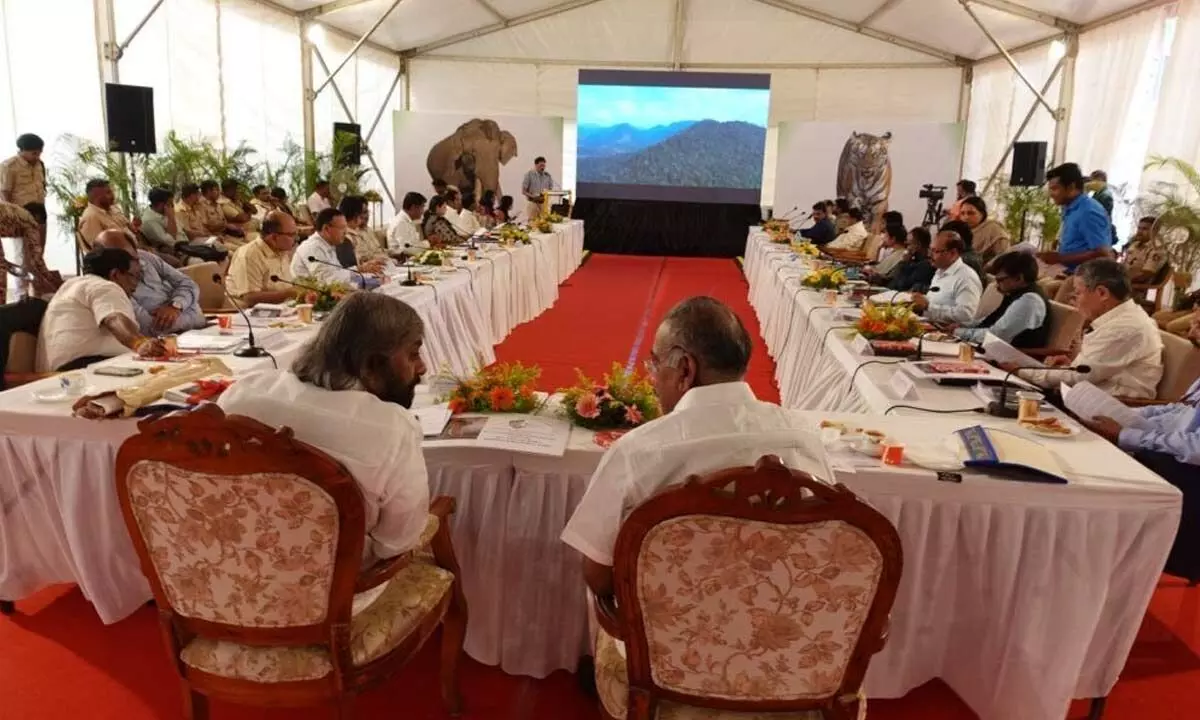Live
- Exhilarating ‘Benchmark’ of Venkat Changavalli
- Development activities worth `30 cr launched in Puthalapattu constituency
- Allegations against KTR baseless: BRS leader
- Megastar Chiranjeevi to Visit Allu Arjun’s Residence at 12 PM Today
- Nilima Rane: Trailblazer in Nursing
- Casual yet stylish office outfits for all-day comfort
- TTD to suspend all special darshans from January 10 to 19 amid Vaikuntha dwara darshans
- Naidu pats TDP leaders, cadres for enrolling 73L members
- Rupali Ganguly says for 20 years she never got an award
- Advanced anti-drone systems deployed for devotees’ safety at Mahakumbh
Just In
K’taka, TN, Kerala to jointly tackle wildlife conflict, conservation


- YSRC Forest ministers, top official of 3 states hold meeting at Bandipur
- Coexistence with wildlife is essential: Eshwar Khandre
Bandipur: Forest, Ecology and Environment Minister Eshwar Khandre said that the states of Karnataka, Tamil Nadu and Kerala have decided to work together to prevent wildlife conflict, poaching, forest and wildlife conservation.
Kerala Forest Minister A K Sashindran in the first coordination meeting of the top officials of the forest department of Karnataka, Kerala and Tamil Nadu states, he said that this is not a meeting that is being held on the order of the central government, but it is the result of the concern and self-effort of the three southern states.
Wild animals roam freely from one forest to another. Elephants have roamed freely between Tamil Nadu, Kerala and Karnataka for several centuries, and no wild animal is bound by state borders. There is an elephant corridor. Tigers also move from one forest to another. He said that measures to be taken to reduce damage to precious lives or crops due to these wildlife in any state will be given a tangible form soon.
Late Prime Minister Indira Gandhi laid emphasis on forest conservation and wildlife conservation and enacted Acts. He said that as a result of all subsequent governments’ emphasis on the protection of forest and wildlife wealth, today the forest has also been preserved and the number of wild animals has also increased.
He said in today’s meeting, it was decided to cooperate with each other to save the natural environment by adopting the best practices of these three southern states for the conservation of forest and wildlife.
The three states of Karnataka, Kerala and Tamil Nadu are doing well in forest and wildlife conservation programmes. That is why the number of wildlife has increased in these three states. Eshwar Khandre emphasized that it is crucial to continue these efforts.
Cases of wildlife-human conflict are on the rise as residential areas become deforested due to increase in wildlife and population. In this regard, every living being born on earth has the right to live. Thus, he asserted that it is essential for people living in forested areas to co-exist with wildlife.
Every life is precious and concerted efforts should be made in this regard. In Karnataka, elephant moats are being built to prevent elephants from getting into trouble, and solar fences are being installed. Besides, the railway is being barricaded, he said.
Minister Eshwara Khandre proposed to adopt a joint standard operating procedure (SOP) to manage human-animal conflict and said collaboration between various departments is essential in this regard.
Top officials of Tamil Nadu Forest Department were also present in this meeting. In the meeting, the best practices adopted in all the three states in forest and wildlife conservation were discussed, knowledge was exchanged and new discoveries were also discussed, he said.
Prevention of wildlife-human conflict and poaching, forest fire control requires efficient use of advanced technology. This was also briefly discussed in the meeting and the use of technology will be emphasized in the upcoming meetings between the three states. He said that cooperation is also necessary to eliminate the problem of sanna and lantana weeds, and it is proposed to form an advisory committee for technology adoption and weed destruction.
Highlights of the meeting: Collaborative initiatives
Shared responsibility consensus: Identifying and expanding wildlife habitats. Commitment to forest conservation despite expanding residential areas.
Charter of Collaboration: A heartfelt pledge to work together across borders to reduce human-animal conflicts.
Strategic Coordination: Seamless collaboration, structured information sharing and joint effort against human-wildlife conflict challenges.
Resource Exchange Programme: Symbolising coordination, this program facilitates the exchange of critical resources, expertise and knowledge.
Estimation of wildlife numbers and joint operations: Informed decision making based on wildlife numbers and through coordinated operations.
Advisory Council: Proposal to constitute an Advisory Council comprising wildlife conservation experts to provide valuable insights to enhance conflict management strategies.
Review and Adaptation: Regular review of governance for sustainable excellence and adaptation to evolving responsibilities.
Shared vision for the future:
The Charter embodies a shared vision that transcends administrative boundaries and aims to create a legacy of responsible conservation in which humans and wildlife coexist in harmony.
The meeting was attended by senior dignitaries including Additional Chief Secretaries, Principal Chief Conservator of Forests (PCCF), Chief of Forest Force, Chief Wildlife Wardens and other officials from Karnataka, Kerala and Tamil Nadu.

© 2024 Hyderabad Media House Limited/The Hans India. All rights reserved. Powered by hocalwire.com






